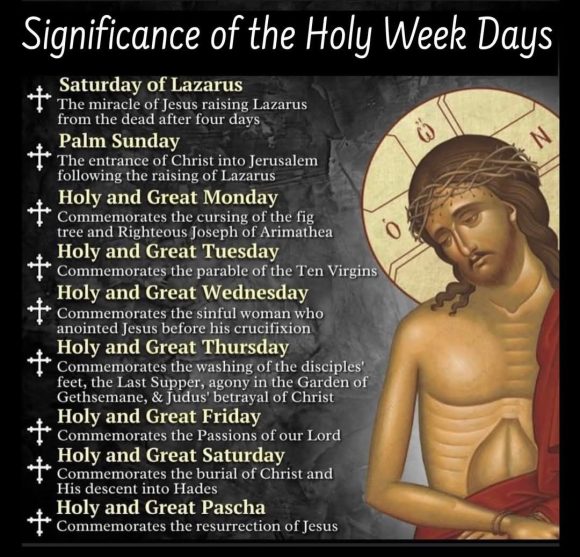On our way to Jerusalem
Tag: Holy Week
Great and Holy Tuesday
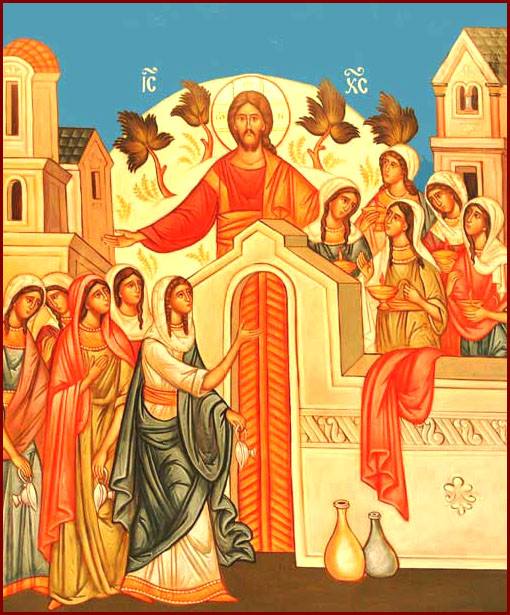 The Troparion at Matins:
The Troparion at Matins:
“Behold, the Bridegroom is coming in the middle of the night. Blessed is the servant he shall find awake. But the one he shall find neglectful will not be worthy of him. Beware, therefore, O my soul! Do not fall into a deep slumber, lest you be delivered to death and the door of the kingdom be closed to you. Watch instead, and cry out: Holy, holy, holy are you, O God. Through the intercession of the Theotokos, have mercy on us.”
This troparion is sung at the beginning of Matins on Holy Monday, Tuesday and Wednesday, giving these services the name of “Bridegroom Matins.” They have become the main service in the Greek and Melkite traditions. Here Holy Week preserves the most ancient traditions of the Divine Praises. In antiquity, the Matins was a middle of the night service, and therefore this troparion expressed the Christian need for constant watchfulness for the presence of God. In Holy Week the parable of the wise and neglectful virgins in read in the Gospel for the Presanctified Divine Liturgy. We must be aware that the Lord is coming. In every Divine Liturgy of St. John Chrysostom, when the presider begs the Father to send the Holy Spirit, he prays that the Spirit may be for a spirit of vigilance. St. Paul warns us: For all of you are children of the light and children of the day. We are not of the night or of darkness. Therefore, let us not sleep as the rest do, but let us stay alert and sober” (1 Thessalonians 5:5-6). This is especially important in Holy Week, where the disciples fail in watchfulness in Gethsemane: “When he returned to his disciples he found them asleep. He said to Peter, “So you could not keep watch with me for one hour? Watch and pray that you may not undergo the test” (Matthew 26:40-41). Holy Week tests our spiritual awareness.
Indeed, the Matins Gospel has Jesus’ condemnation of the scribes and pharisees. “They tie up heavy burdens hard to carry and lay them on people’s shoulders, but they will not lift a finger to move them …. “Woe to you, scribes and Pharisees, you hypocrites. You lock the kingdom of heaven before human beings. You do not enter yourselves, nor do you allow entrance to those trying to enter” (Matthew 23:4.13). This is so often the clerical sin, to neglect the welfare of people for the sake of a prideful ideology. The Holy Week is a direct challenge to our spirituality— how have we failed to proclaim the gospel. Have we learned the lesson of love? The story of the Last Judgment, read at the evening gospel, tells us what we must do for one another, and especially to see the image of Christ in the other. In the long run, this is where “keeping our eyes fixed on Jesus” leads us.
Holy Days Schedule 2018
![]()
The Holy Week Schedule
Join us in prayer, bring a friend for the week that changed the world!
Holy Thursday, March 29
7:00 p.m. Matins with the Passion Gospels
Holy Friday, March 30
—A day of strict fast and abstinence NO meat or dairy products
4:00 p.m. Vespers and Veneration of the Holy Shroud
Holy Saturday, March 31
8:30 a.m. Divine Liturgy of St. Basil
4:00 p.m. Blessing of Easter Foods
5:00 p.m. Blessing of Easter Foods
6:00 p.m. Prayer at the Tomb —Procession and Paschal Matins
Pascha, April 1 The Glorious and Holy Sunday of the Resurrection of Our Lord, God and Savior, Jesus Christ
10:30 a.m For people of the parish
Blessing of Artos
Blessing of Easter Foods
Epistle: Acts of the Apostles 1:1-8
Gospel: John 1:1-17, Tone 2
Holy Wednesday
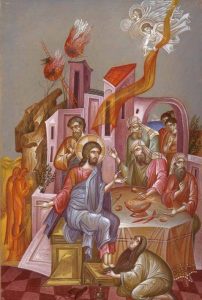 The Matins gospel proclaims that Christ has reached the hour of his glory. His glory is his infinite divine love for the human race, by which he tramples death by death:
The Matins gospel proclaims that Christ has reached the hour of his glory. His glory is his infinite divine love for the human race, by which he tramples death by death:
“I am troubled now. Yet what should I say? ‘Father, save me from this hour’? But it was for this purpose that I came to this hour. Father, glorify your name.” Then a voice came from heaven, “I have glorified it and will glorify it again.” The crowd there heard it and said it was thunder; but others said, “An angel has spoken to him.”Jesus answered and said, “This voice did not come for my sake but for yours. Now is the time of judgment on this world; now the ruler of this world will be driven out. And when I am lifted up from the earth, I will draw everyone to myself.(John 12:27-29)” It is truly “time for the Lord to act.”
The evening gospel is a study in contrasts. This meal at the home of Simon the Leper is juxtaposed with the meal in the upper room, the last or mystical supper. It is a tradition that Judas Iscariot was the son of Simon the Leper. The sinful woman is contrasted with the elite apostle, one of the twelve. The woman finds salvation through an effusive outpouring of expensive myrrh, the apostle disapproves (though not alone in his disapproval), feigning a virtuous love for the poor.
“A woman came up to him with an alabaster jar of costly perfumed oil, and poured it on his head while he was reclining at table. She has done a good thing for me …. In pouring this perfumed oil upon my body, she did it to prepare me for burial.(Matthew 26:7-12) But “one of the Twelve, who was called Judas Iscariot, went to the chief priests and said, “What are you willing to give me if I hand him over to you?” They paid him thirty pieces of silver. (Matthew 26:14-15)” What does betrayal of the Lord mean? It was for this action of Judas that this Wednesday was called “Spy Wednesday,” and that abstinence was prescribed for Wednesdays.
The holy nun Cassia wrote a beautiful sticheron on this theme. The corpus of her works is not large, but very important, it includes also the doxasticheron for Christmas.
Holy Tuesday
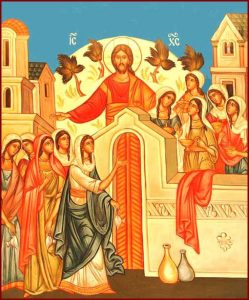 Troparion at Matins:
Troparion at Matins:
“Behold, the Bridegroom is coming in the middle of the night. Blessed is the servant he shall find awake. But the one he shall find neglectful will not be worthy of him. Beware, therefore, O my soul! Do not fall into a deep slumber, lest you be delivered to death and the door of the kingdom be closed to you. Watch instead, and cry out: Holy, holy, holy are you, O God. Through the intercession of the Theotokos, have mercy on us.”
This troparion is sung at the beginning of Matins on Holy Monday, Tuesday and Wednesday, giving these services the name of “Bridegroom Matins.” They have become the main service in the Greek and Melkite traditions. Here Holy Week preserves the most ancient traditions of the Divine Praises. In antiquity, the Matins was a middle of the night service, and therefore this troparion expressed the Christian need for constant watchfulness for the presence of God. In Holy Week the parable of the wise and neglectful virgins in read in the Gospel for the Presanctified Divine Liturgy. We must be aware that the Lord is coming. In every Divine Liturgy of St. John Chrysostom, when the presider begs the Father to send the Holy Spirit, he prays that the Spirit may be for a spirit of vigilance. St. Paul warns us: For all of you are children of the light and children of the day. We are not of the night or of darkness. Therefore, let us not sleep as the rest do, but let us stay alert and sober” (1 Thessalonians 5:5-6). This is especially important in Holy Week, where the disciples fail in watchfulness in Gethsemane: “When he returned to his disciples he found them asleep. He said to Peter, “So you could not keep watch with me for one hour? Watch and pray that you may not undergo the test” (Matthew 26:40-41). Holy Week tests our spiritual awareness.
Indeed, the Matins Gospel has Jesus’ condemnation of the scribes and pharisees. “They tie up heavy burdens hard to carry and lay them on people’s shoulders, but they will not lift a finger to move them …. “Woe to you, scribes and Pharisees, you hypocrites. You lock the kingdom of heaven before human beings. You do not enter yourselves, nor do you allow entrance to those trying to enter. (Matthew 23:4.13)” This is so often the clerical sin, to neglect the welfare of people for the sake of a prideful ideology. The Holy Week is a direct challenge to our spirituality – how have we failed to proclaim the gospel. Have we learned the lesson of love? The story of the Last Judgment, read at the evening gospel, tells us what we must do for one another, and especially to see the image of Christ in the other. In the long run, this is where “keeping our eyes fixed on Jesus” leads us.
Holy Monday
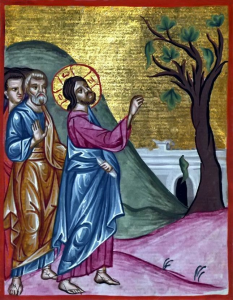 The Synaxarion [the abridged collection of the “Lives of the Saints,”] discerns two themes in Holy Monday:
The Synaxarion [the abridged collection of the “Lives of the Saints,”] discerns two themes in Holy Monday:
1) A comparison between Jesus and Joseph, the son of Jacob:
“[Jesus] was sold by a disciple for thirty pieces of silver and was imprisoned in the dark and gloomy pit of the grave, whence He broke out by His own power, triumphing over Egypt, that is, over every sin. In His might He conquered it, and He reigns over all the world. In His love for mankind He redeemed us by a distribution of grain, inasmuch as He gave Himself up for us and He feeds us with Heavenly Bread, His own Life-bearing Flesh. For this reason, Joseph the All-comely is brought to mind at this time.”
2) the cursing of the fig tree.
The Synaxarion said this was a cursing of the Jewish people, who did not bring forth the expected fruit. The gospel itself sees it as the power of prayer: ““Amen, I say to you, if you have faith and do not waver, not only will you do what has been done to the fig tree, but even if you say to this mountain, ‘Be lifted up and thrown into the sea,’ it will be done. Whatever you ask for in prayer with faith, you will receive” (Matthew 21:21-22).
Many of the texts of Holy Week can be interpreted in an anti-Jewish sense. The Synaxarion is more explicitly so. I think it is a problem. But did the Church formally condone persecution of the Jews? I don’t think so, but some pretty strong texts have led weak-minded and hateful people to interpret them so, causing a series of pogroms and culminating in the Nazi holocaust. In 1998 Pope St. John Paul II wrote: “We deeply regret the errors and failures of those sons and daughters of the Church. We make our own what is said in the Second Vatican Council’s declaration Nostra Aetate, which unequivocally affirms: ‘The Church . . . mindful of her common patrimony with the Jewish and motivated by the Gospel’s spiritual love and by no political considerations, deplores the hatred, persecutions, and displays of anti-Semitism directed against Jews at any time and from any source’”
Holy Saturday services
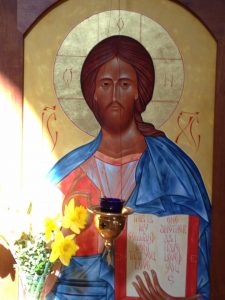 Great and Holy Saturday, April 15
Great and Holy Saturday, April 15
8:00 a.m. Divine Liturgy of St Basil the Great
4:00 p.m. Blessing of Easter Foods
6:00 p.m. Blessing of Easter Foods
7:00 p.m. Prayer at the Tomb
Good Friday at the Parish
The Veneration of the Holy Shroud
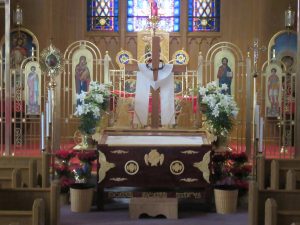
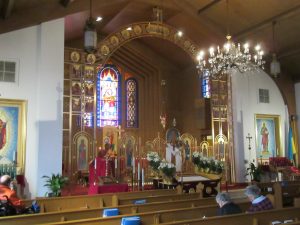
Good Friday service
TODAY at St Michael’s, Good Friday
4:00 p.m. Vespers and Veneration of the Holy Shroud
Blessing Easter Foods
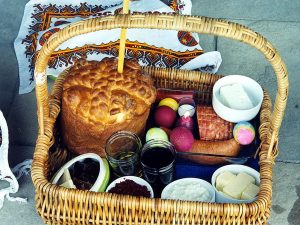 Blessing Easter food baskets
Blessing Easter food baskets
Fr. Iura will bless food items
Holy Saturday
4:00 p.m. Blessing of Easter Foods
6:00 p.m. Blessing of Easter Foods
Easter Sunday
following the 9:30 a.m. Divine Liturgy
***check either church or hall
